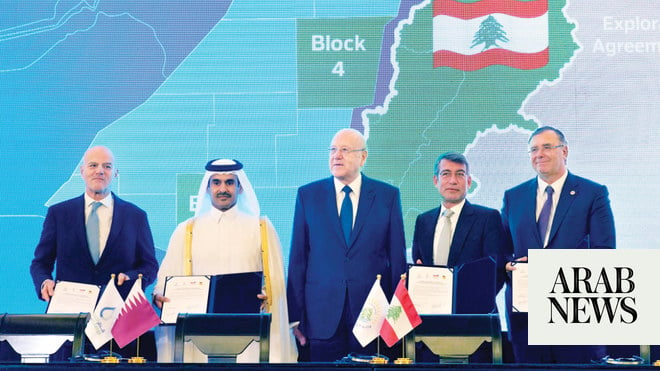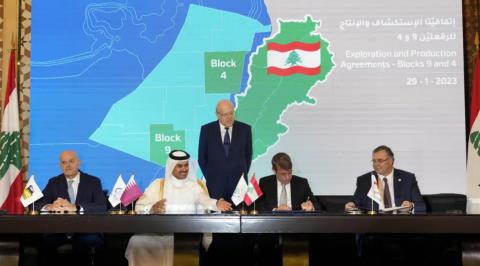
Country hopes discoveries of commercial quantities of fuel will help reverse economic crisis
BEIRUT: Lebanon announced on Sunday that Qatar has entered a consortium to explore for offshore gas in the Mediterranean Sea off the Lebanese coast.
The country is also counting on the participation of some other Gulf states in the consortium, a political observer said.
Lebanon is hoping the exploration and discovery of commercial quantities of oil and gas will help it overcome its current economic crisis.
The deal will see QatarEnergy receive a minority 30 percent stake in the two blocks of Lebanon’s exclusive economic zone.
QatarEnergy joins the consortium of TotalEnergies of France and Italy’s Eni company for oil and gas exploration in the two Lebanese blocks following the withdrawal of Russia from the agreement.
Lebanon’s share would range from 54 to 63 percent after the deduction of operational and capital costs, in any instance of oil and gas discovery.
Russian company Novatek withdrew from the exploration consortium in the wake of tensions resulting from the Ukraine conflict.
It announced its withdrawal last summer due to US sanctions as the company was no longer able to make any financial transfers outside Russia.
The new agreement was signed by Walid Fayad, Lebanon’s energy minister; Saad bin Sherida Al-Kaabi, Qatar’s energy minister and president and CEO of QatarEnergy; Patrick Pouyanne, CEO of TotalEnergies; and Claudio Descalzi, CEO of Eni.
The ceremony was held at the headquarters of the Lebanese prime minister and in the presence of the ambassadors of Qatar, France and Italy.
The agreement was the result of months-long talks and coincided with practical procedures initiated by the operator to carry out exploration and drilling activities during this year.
Najib Mikati, Lebanese caretaker prime minister, paid tribute to US mediator Amos Hochstein and his team for their handling of the indirect negotiation process between Lebanon and Israel to demarcate the maritime borders at the end of last year, which resulted in an agreement.
Fayad said he hoped the deal would initiate “the beginning of a new phase that would contribute to placing Lebanon on the petroleum map in the region, and boosting its role as an investment destination.”
He added that the deal demonstrates that “[countries] still trust Lebanon, despite all the crises it is going through.”
Al-Kaabi said: “It’s not the first exploration attempt in Lebanon, but it is a serious attempt for a promising exploration in the eastern Mediterranean basin.”
He added: “We are actually present in this region and not far from here, as we have discovered gas in the Glaucus well offshore Cyprus.
"There are many elements that make this agreement important for both Lebanon and QatarEnergy. One of these elements is that it came after the maritime border demarcation agreement, which paved the way for us to begin this ambitious effort.”
The Qatari minister sent the greetings of Sheikh Tamim bin Hamad Al-Thani, who gave his hopes for a better future for Lebanon and its people.
Pouyanne said that “the maritime border demarcation resulted in a new momentum to explore the country’s hydrocarbon potential.”
He added: “We are determined, along with our partners, to drill an exploration well in Block 9 as soon as possible in 2023, and our teams are being fully equipped to carry out these operations.”
Pouyanne pointed out that the new deal between TotalEnergies and QatarEnergy expanded the scope of international cooperation in the exploration field, and raised the number of countries in which the two companies operate to nine.
Descalzi said: “This deal comes at a crucial time, as energy constitutes the basis of relations between the countries, and the Russian gas supply to Europe has been halted.
“I am very optimistic, especially since we are working with the best teams in this field and with the best international companies, QatarEnergy and TotalEnergies.
“We hope we will be able to achieve the desired commercial explorations for the benefit of the Lebanese people.”












